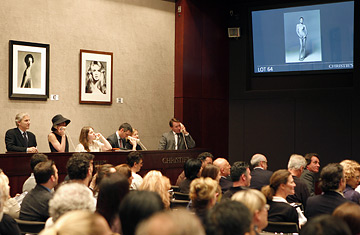
A nude photo of former model Carla Bruni-Sarkozy, the wife of French President Nicolas Sarkozy, sold for $91,000 at Christie's auction in New York
Despite France's jealously protective stance toward the nation's artistic reputation, contemporary French art has been streaming out of the country and into the hands of foreign buyers at an alarming rate in recent years. The government of President Nicolas Sarkozy was already on the case — even before nude photos of First Lady Carla Bruni-Sarkozy were auctioned in London last week to a Chinese investor for $91,000. France's Culture Ministry has announced measures aimed at reversing the general lack of interest among the French in buying art — a deficiency some fear is slowly bleeding an enormous vein of national culture dry.
Addressing concerns about the decline of French culture and economic interests, French Culture Minister Christine Albanel unveiled a series of proposals earlier this month to stimulate spending on art works by French buyers. She wants to change exisiting laws so that the sale and auction of modern art can become as simple in France as it is in booming American and British markets. She has also proposed tax breaks and no-interest loans to induce small businesses and individuals to begin investing and collecting contemporary works that many now feel are beyond their financial range. In reality, Albanel noted, the average work of modern art in France sells from $7,500 to $15,500 — prices that could make creating modest art collections via interest-free loans more affordable than parking funds in the preferred French investment of real estate.
Without such measures, Albanel warned, France's art will continue to be snapped up by buyers abroad, while deep-pocketed French collectors will keep preferring to purchase the classic, often foreign-origin works they consider more valuable in terms of status and potential profit. "For every work that is imported, two works are exported," Albanel lamented.
The proposal still has to be approved by a parliament that is currently focused on cutting government spending rather than promoting art sales. But there's good reason to think Albanel's project will get clearance. First, the plan is nearly pain-free for the state: commercial banks, not the government, would provide the zero-interest loans to purchasing clients in exchange for tax breaks for supporting the arts. Complex rules and restrictions that have limited corporate investment in art to only the largest French companies are also to be relaxed and simplified to encourage smaller businesses to get involved. Similarly, loosening tight regulations on large art auction houses would aim to stimulate that trade, and in doing so increase tax revenues.
Along with promoting France's modern cultural works, Abanel is also looking to protect significant French economic interests in the arts sector, which currently employs around 50,000 people across 10,000 companies. Public auctions yield around $2 billion in annual business, and Albanel estimates that sales between private parties represents as much as $10 billion per year. But while the French art market has been growing by around 13% a year, others are growing faster.
Last year France was shocked to lose its third-place position in global art sales to China, whose 7.3% stake ranked it behind 41.7% for the U.S. and 29.7% for Britain; France's take was just 6.4%, according to a recent study by art specialist Artprice. Just three decades ago, French art sales made up a quarter of the world total. But the picture gets even worse in the modern art sector, where French activity in 2007 represented a mere 2.8% stake of the world market, Artprice reported.
Detractors of France's "exception culturelle" — and its policy of subsidizing, promoting and protecting artistic and cultural products as a matter of national interest — note that past government efforts to artificially fund markets has done little to halt Frances' declining creativity. But not only do Albanel and her supporters contest the idea that French cultural vibrancy is fading; they also have a nice retort to free-market enthusiasts decrying her plan. Albanel's project is roughly based on the "Own Art" scheme launched in Britain in 2004 by Arts Council England. The program is credited with having created 10,000 new, mostly middle class modern art collectors in just three years, and inspired a similar program in the Netherlands.
Should Albanel's plan succeed in creating a new generation of French collectors eager to keep France's modern art works at home,in some cases literally,the nation just may snatch its third place spot back from China. And if they can do that, perhaps French officials can come up with an equally efficient policy for getting the foreign-owned photos of their under-dressed First Lady back under domestic wraps.
